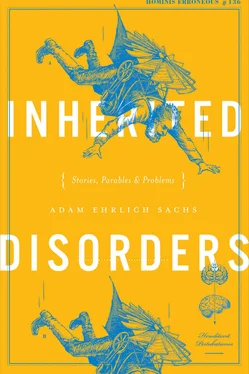The conversation began haltingly, inauspiciously, with obligatory chitchat about their mutual friend. But soon they turned to the unbearable expectations that each bore through life due to the abortive undertaking of his respective adventurer father, and the conversation warmed. The son of the sea kayaker related how his father tried to cross the Pacific in a traditional Inuit kayak he’d built himself out of driftwood, animal skins, and whale fat. He drowned off the islands of Tuvalu. Completing this feat was the obligation that his son was burdened with — or rather, as his therapist put it, was the obligation that he had chosen to burden himself with. For years he had obsessively collected driftwood, animal skins, and whale fat. But he had always hated the sea — probably, he laughed, for obvious reasons — and was in no hurry to build his traditional kayak and set out into the Pacific. Neither, however, could he subdue or dispel, even with his therapist’s help, the enveloping sense of obligation he felt.
“I know exactly what you mean!” cried the mountaineer’s son. His father, he explained, had plunged to his death a hundred feet from the top of Gangkhar Puensum, the highest unclimbed mountain in the world. Now he had to climb it. Everyone told him: “You do not have to climb Gangkhar Puensum.” His mom told him: “You do not have to climb Gangkhar Puensum.” His therapist, who was not — they checked — the sea kayaker’s son’s therapist, told him: “This is an obstacle you have constructed for yourself in your own mind. No one expects you to climb Gangkhar Puensum.”
The son of the sea kayaker smirked. “But of course you have to climb Gangkhar Puensum.”
“Of course I have to fucking climb it!”
Laughter. Their mutual friend was right: they had a lot in common. Each understood the sense of obligation — half-invented and half-real, or wholly invented and at the same time wholly real, completely subjective but completely objective, ridiculous but binding — felt by the other. In many respects they were the same person, except that the sea kayaker’s son hated the sea and loved the mountains, whereas the mountaineer’s son hated the mountains and loved the sea. (They agreed that the sea evoked the infinite, but disagreed about whether the infinite was a good thing or a bad thing.)
They got drunker and drunker, laughed louder and louder, and at one point in the evening even cried a little bit. Sometime after midnight, the son of the sea kayaker said: “Have you ever seen Strangers on a Train ?”
“The Hitchcock movie? I’ve read a plot synopsis.”
“I think we should each agree to fulfill the other’s father’s legacy.”
It was not a crazy idea, they realized. They shook on it. The mountaineer’s son would construct a traditional Inuit kayak out of driftwood, animal skins, and whale fat, and use it to cross the Pacific. The sea kayaker’s son would climb Gangkhar Puensum.
Beautiful.
Each slept uncharacteristically well that night, pleased that his father’s legacy would finally be fulfilled, relieved that it would not be by him.
Their mutual friend emailed them the next morning with a new complication.
Sea kayaker’s son, mountaineer’s son, he wrote, meet the son of the guy who attempted the world’s highest skydive. I’m sure you guys will hit it off.
They have since coordinated a three-way exchange. The mountaineer’s son will cross the Pacific in a traditional Inuit kayak. The skydiver’s son will summit Gangkhar Puensum. And the sea kayaker’s son will leap from a balloon at 130,000 feet wearing a special pressurized suit. Each will ensure that his father’s legacy is fulfilled, but without merely following in his father’s footsteps. Each will at the same time honor his dad and strike out in a new, literally a new, direction from him — the mountaineer’s son moving across rather than up, the skydiver’s son up rather than down, and the sea kayaker’s son down rather than across. It is unlikely that all three will survive their respective feats.
Their mutual friend has taken pride in orchestrating all this. His father was also known as a great connector of people and facilitator of conversations who was always putting interesting people in a room together .
…………………….
The father of a Tunisian activist kidnapped last week by extremists in Tunis has offered himself up in exchange for his son. The fathers of the extremists have offered to replace the extremists, and the fathers of the journalists covering the situation have offered to replace the journalists. The fathers of Tunisian officials have offered to replace the officials, and the fathers of Tunisian military commanders have offered to replace the commanders. Across Tunisia, the fathers of everyday Tunisians have offered to replace their sons, and, in solidarity with them, fathers around the world have offered to replace their sons. These offers, which would not solve the situation but merely age it by roughly thirty years, have been uniformly rejected.
…………………….
A sweeper for the Canadian national curling team lost his father just one week before the 1998 Nagano Olympics. The sweeper — whose job it is to influence the path and speed of the curling stone by sweeping the ice in front of it with a broom — told his coach that he could not compete. The Canadian coach tried to respond, “I think your father would want you to keep sweeping,” but apparently he found this sentence too preposterous to actually utter aloud. Three times he tried to say the sentence, “I think your father would want you to keep sweeping,” but each time he found it too preposterous to utter aloud, so at the last minute the Canadians were forced to replace the sweeper with a substitute.
…………………….
A man who studied the human mind through biochemistry and his son who studied it through introspection found that they had less and less to say to each other until one Christmas dinner they sat across from each other for two hours and said nothing at all.
“This is no good,” said the father after dessert.
“No,” said the son.
They were both sentimental men, and were both, at this point, holding back tears, though of course the father thought he was crying for fundamentally biochemical reasons while the son thought he was crying for irreducibly introspective ones.
So they came up with a plan. Each would suggest ten books to the other, books that epitomized his own worldview, respectively biochemical and introspective. They would read all ten books over the course of the year, and by next Christmas they would each understand the other’s worldview and have plenty to talk about.
In January, as each energetically compiled his list, they had high hopes.
In February they traded lists. By March all the books were in hand.
But when the son opened the first book recommended by his father and read the first sentence, up to the first comma, he realized he would never understand his father’s worldview. One introspective tear fell onto the page. Same for the father: he opened the first book, read the first clause of the first sentence, gave up on the possibility of ever understanding his son, and shed a single biochemical tear onto the page.
The son threw his father’s books in a dumpster, and the father jammed his son’s books into a charity drop box. Through an astonishing and amusing sequence of events, too illogical and unlikely to relate here, all twenty books ended up several years later at the same insane asylum library in Wisconsin, where they were discovered in two stacks of ten by an ingenious psychopath named Herbert.
Читать дальше












